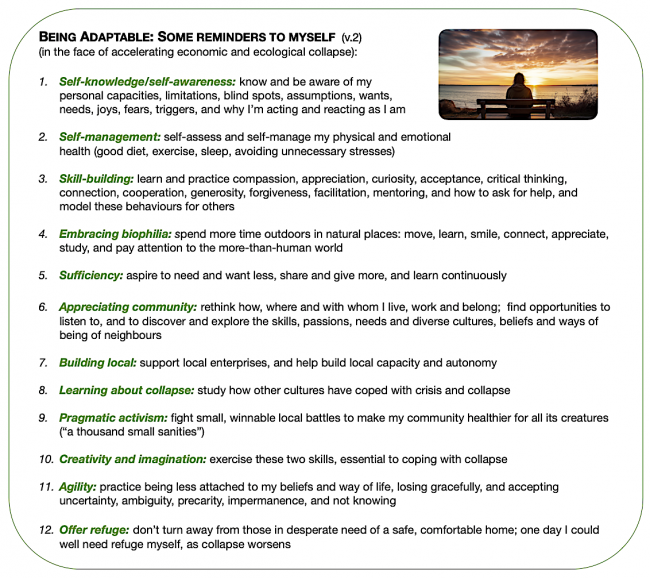
I don’t believe we have free will, nor do I believe that our civilization’s accelerating collapse can be prevented or even mitigated. So I no longer provide advice on what people “should do” in the face of collapse. Instead, I just refer to this ‘reminders’ list to try to assess how adaptable I will be as collapse deepens, and hence how useful I am likely to be to the world as that happens. Some people I know have said they found it valuable to compile a similar list for themselves. [Updated Jan.5/24; image by Midjourney AI, my own prompt]
I was recently honoured to be selected to be the first interviewee on a new podcast series called Reskillience, led by Australian permaculturalist Catie Payne. Catie’s an accomplished podcaster (having done a series of over 100 programs on homesteading), and an extraordinarily fine interviewer. This was far and away the easiest interview I’ve ever done.
The series is all about developing useful skills for coping with collapse, and I was chosen based on this article from last September called How Do We Teach the Critical Skills Needed to Face Collapse?, which was republished by Resilience.
There’s not a lot that regular readers will get from the podcast that you haven’t already heard me say, but if you’re curious to hear what my voice sounds like talking about this for an hour and a quarter (believe me, I’m a better writer than speaker), it was fun to do and you might enjoy it. And by all means check out and subscribe to the rest of Catie’s series; the second program in the series is now up as well.
The interview with me is available on Zencastr here, on Apple Podcasts here, and on Spotify podcasts here.





Great! So keen to have a listen today. Dave, I’m so glad to have connected with you as a writer (and speaker). Last night I listened to BernardoK based on the post you did on the review of Sapolsky book. I loved what BK had to say, espescially his rant on Schopenhauer, and then I saw in the comments that you have contacted Sapolsky regarding your theory (keep us updated), so I was just glad to follow along with this, it’s intellectually so fascinating to me. I also felt a lot of releif yesterday from my willful energies after listening to Berardo as I find I constantly just forget all this stuff and believe that I am a real person directing my own existence – and it’s a painful way to live, hearing that my life is not about me is so refreshing.
I wanted to leave a comment on your review post of Sapolsky, but I see that you close the comments off after a while – fair enough. But just to say that the table you made up, with the columns; I think there is a strand of non duality which you have identified as the traditional non dual (eastern spirituality) that has some crossover and blurriness with the final column of radical non duality.
For example there is a lineage of teachers who have ‘sat with’ Ramesh Balsekar, who all align with his teaching of ‘non doership’ and this would be summed up as:
“everything that happens in life is happening exactly as it is destined to. That what we think are ‘our’ actions and the actions of the ‘other’ can become seen in quite a different light. It can be seen that we are not the ‘doers’ and therefore the feelings of guilt, blame, pride, worry and expectation no longer have a basis on which to arise when there is the recognition that we have been designed to act in each moment exactly the way we do, and that our true nature is always complete and does not need pleasure in the future to be content and happy.”
The main teacher I have listened to has this idea of non doership as core, but also influenced heavily by Schopenhauer and a number of other older western philsophers.
Also to say that even those who have had this complete dropping away of the self, such as David Carse (his audio book read by terrence stamp) in their disorientation have retrospectively gone back and studied some of the ‘traditional eastern teachings’ in order to make sense of what happened to them – Suzanne Segal is another example of that. Peolple who were blinded sided by the self falling away. She spent 10 years in therapy thinking she had gone made until she came to understand that no self is the natural state of being. I wonder what your thougths would be on that? but first I will listen to your podcast with the australian woman, what a treat.